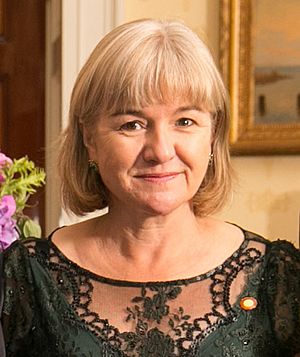Charlotte Harland Scott facts for kids
Quick facts for kids
Charlotte Scott
|
|
|---|---|
 |
|
| Acting First Lady of Zambia | |
| In role 28 October 2014 – 26 January 2015 |
|
| President | Guy Scott |
| Preceded by | Christine Kaseba |
| Succeeded by | Esther Lungu |
| Second Lady of Zambia | |
| In role 23 September 2011 – 28 October 2014 |
|
| Vice President | Guy Scott |
| Preceded by | Irene Kunda |
| Succeeded by | Position Vacant |
| Personal details | |
| Born |
Charlotte Harland
13 November 1963 Blackheath, London, England |
| Political party | UPND (since 2016) PF (former) |
| Spouse | |
| Alma mater | University of Bath (PhD) University of Reading (M.A.) University of Oxford (B.A.) |
| Occupation | International development specialist |
Charlotte Harland Scott (born 13 November 1963) is an expert in economic and social development. She was born in Britain but is also a citizen of Zambia. From October 2014 to January 2015, she served as the First Lady of Zambia. This was when her husband, Guy Scott, was the country's acting President. Before that, she worked for UNICEF Zambia, helping with social policy and economic analysis. In 2016, Charlotte Scott ran for a seat in the Zambian Parliament.
Contents
Growing Up and School
Charlotte Harland Scott was born in Blackheath, London, England, on November 13, 1963. She was the second of three daughters. Her parents, Robin and Janet Harland, had met while studying at Oxford University. Charlotte grew up in Greenwich, a part of southeast London. She is a member of the Church of England.
She went to school in London, including Westminster School. In 1986, she earned her first degree in psychology and development studies from the University of Oxford. The next year, in 1987, she got a master's degree in rural development from the University of Reading. Later, in 2007, she completed her PhD from the University of Bath.
Her Life in Zambia
In 1989, when Charlotte was 26, a British aid organization hired her. They asked her to work in Zambia, a country in southern Africa. She arrived in Zambia in July 1989. Her job placed her in a town called Mpika, in Muchinga Province. By 1991, she was living in a village near Mpika.
Charlotte met her future husband, Guy Scott, around the time of the 1991 Zambian general election. Guy Scott was helping with the election campaign for Michael Sata, who would later become President. Charlotte and Guy married in 1994. Their wedding was held in Lusaka, the capital city of Zambia.
Her Work and Public Role
Charlotte Scott has worked for over twenty years in areas like economic and social development. She helped create a government program in Zambia called the Public Welfare Assistance Scheme. This program aimed to help people in need and reduce poverty. It was an early example of what are now called "social cash transfers," where families receive money if they meet certain conditions. In 2014, UNICEF praised this program as one of the best research programs globally.
From 2007 to 2012, Scott was a chief officer for UNICEF in Zambia. In this role, she worked on social policy and economic analysis. She traveled to almost every district in Zambia. She left her job at UNICEF in 2011. This was because her husband, Guy Scott, became the Vice-President of Zambia. United Nations rules say that if a staff member's spouse gets a high political job, the staff member must either leave or take a new job in another country. She chose to leave her position.
In 2013, Charlotte Scott became a visiting fellow at the Institute of Development Studies in England. She often speaks out about important issues in Zambia. These include the rights of children, fairness between genders, stopping violence against women, and making sure women can get an education.
Becoming First Lady
On October 28, 2014, President Michael Sata passed away. His Vice-President, Guy Scott, then became the acting President of Zambia. This meant Charlotte Scott became the First Lady of Zambia for a short time. They were the first white President and First Lady in the country's history. Even though they were in these important roles, they did not move into the official presidential home.
Guy Scott could not run for president in the special election that followed. This was because the Constitution of Zambia says that a presidential candidate's parents must have been born in Zambia. Guy Scott's parents had moved to Zambia from England and Scotland. Charlotte Scott's time as First Lady ended on January 26, 2015. Esther Lungu then became the First Lady.
Running for Parliament
In 2016, Guy Scott decided not to run again for his seat in Parliament. Charlotte Scott decided to run for that same seat, representing the Lusaka Central area. The United Party for National Development (UPND) chose her as their candidate. She was seen as a strong candidate, along with Margaret Mwanakatwe from the PF party.
During her campaign, on July 18, 2016, Charlotte Scott and her supporters were attacked in Lusaka. News reports said that supporters of the rival Patriotic Front party used stones and screwdrivers to chase them away. Charlotte Scott and her team were not hurt, but their car was badly damaged. She said, "Our team did not fight back. Why can't we campaign peacefully? This is completely wrong!"
In the election on August 11, 2016, Margaret Mwanakatwe won the seat. Charlotte Scott challenged the election results. Later, a court ruled that Margaret Mwanakatwe's election was not valid due to issues like violence and unfair campaigning. However, another court later said that Margaret Mwanakatwe could keep the seat while an appeal was being heard.
 | Selma Burke |
 | Pauline Powell Burns |
 | Frederick J. Brown |
 | Robert Blackburn |

